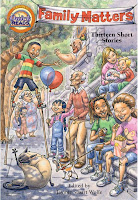 Photo: Symbols of babyhood--a bonnet and chunky books.
Photo: Symbols of babyhood--a bonnet and chunky books.A few weeks ago, the media reported that an 18-year-old from the Philippines was now the record-holder as the “World’s Smallest Man.” This person quit growing at age one year and is only twenty-two inches tall. He has difficulties speaking, easily falls, and must stay home under his mother’s protective care.His family hoped his notoriety of getting in the Guinness Book of Records would help them find medical care for him.
Hormonal anomalies are certainly to blame for this poor young man’s problems. But his situation got me thinking. What if our physical appearance matched our spiritual and emotional maturity?
Both physical and spiritual “growing up” depend on good food and healthy relationships. On the spiritual side, the “food,” of course, is God’s Word—not just head knowledge, but changed-heart results. The apostle Peter said that new believers need “pure spiritual milk” to grow up in their salvation (1 Peter 2:2). Peter also gave us a progressive list of spiritual growth, beginning with faith, then adding knowledge, self-control, perseverance, godliness, brotherly kindness and love (2 Peter 1:5-7). Those latter qualities are honed through social relationships.
I thank God that I had people in my life who cared deeply that I grow spiritually. They helped me develop social skills, challenged me to discover more about myself through volunteering, encouraged me to persevere in difficulties, and prayed for me and with me in life’s tough places.
“Not failure, but low aim, is a sin,” wrote Dr. Benjamin Mays, an American minister and social activist. The rest of his quote goes like this: “The tragedy of life doesn’t lie in not reaching your goal. The tragedy lies in having no goal to reach. It isn’t a calamity to die with dreams unfulfilled, but it is a calamity not to dream. It is not a disgrace to not reach the stars, but it is a disgrace not to have stars to reach for.”
James said the person “who knows the good he ought to do and doesn’t do it, sins” (4:17). We may have failures along the way, but God says to get up, dust yourself off, and try again. You don’t need to stay stunted, afraid of falling.
God cares about this whole spiritual-growing-up process: “The Lord delights in the way of the man whose steps he has made firm; though he stumble, he will not fall, for the Lord upholds him with his hand” (Psalm 37:23-24).



